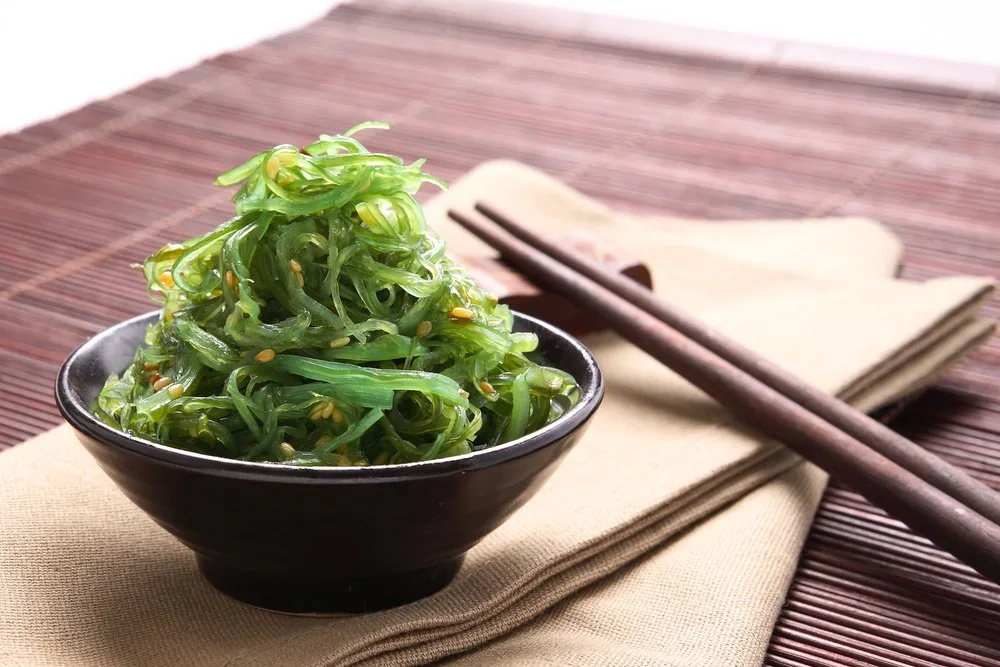Iodine is a trace mineral that is most abundantly found in seafood. It is also found in some other foods and is sometimes added to table salt. Iodine is vital for proper skeletal and central nervous system development in fetuses and young children.
Let’s take a closer look at iodine and precisely why it’s important for your health.
What Exactly Is Iodine?
Iodine is an essential mineral you must get from your diet. The thyroid gland needs iodine to produce thyroid hormones, which are responsible for many important functions in the body. Iodine is an essential micronutrient needed for the proper functioning of your body. On its own, it appears as a small, dark shiny stone or a purple dye. It is also found in trace amounts in water and soil.
Iodine is an essential part of the thyroid hormones thyroxine (T4) and triiodothyronine (T3). Thyroid hormones regulate a whole host of biochemical reactions, such as protein synthesis and enzymatic activity, and are indispensable determinants of metabolic activity.

Photo by Anastasiia Chepinska on Unsplash
What Is the Recommended Daily Amount of Iodine?
The current recommended daily amount of iodine is 150 micrograms (mcg.) Pregnant and lactating women should consume slightly more at 220 mcg and 290 mcg, respectively.
What Are The Problems Related To Iodine Deficiency?
About one-third of the world’s population is at risk of iodine deficiency. This is especially likely in places where there is very little iodine in the soil, including many European countries. Iodine deficiency can lead to goiter which is the swelling of the thyroid gland. This can ultimately impact your long term health. This is what you need to know.
Iodine and hypothyroidism
It can also lead to hypothyroidism which can lead to fatigue, muscle weakness, and weight gain. For tips on living a healthy and energetic life, Energetic Lifestyle has great insights to follow up on.
Iodine deficiency has numerous adverse effects on development and growth, especially in utero and in babies. It is currently the most prevalent and preventable cause of developmental disability in the world. Iodine may also play a role in immune response and may have a positive effect on mammary dysplasia and fibrocystic breast disease. Iodine deficiency disorders result from inadequate thyroid hormone production primarily. Secondly, it stems from insufficient iodine.
Iodine and hormones
Deficiency during early infancy or while pregnant can have irreversible side effects.
Normally, the body controls thyroid hormone concentrations via thyroid-stimulating hormone (TSH). When iodine intake falls below 100 mcg/day, TSH secretion increases. When a person’s iodine intake falls below 10-20 mcg/day, the result is hypothyroidism, which is a condition frequently associated with goiter. Goiter is the first clinical sign of iodine deficiency.
What happens if you are deficient in iodine?
Iodine deficiency of the magnitude stated above in pregnant women can lead to neuro-developmental deficits in the fetus and growth issues, as well as stillbirth or miscarriage.
Severe chronic iodine deficiency while pregnant can also cause cretinism, a birth defect characterized by intellectual disability, motor spasticity, deaf-mutism, delayed sexual maturity, stunted growth, and other neurological and physical abnormalities.
Iodine deficiency in children and infants
Deficiency in children and infants is less severe but can still cause lower than average intelligence as measured by IQ.

Photo by Rainier Ridao on Unsplash
Mild to moderate iodine deficiency in mothers has been linked to increased attention deficiency hyperactivity disorder in children.
What controls your thyroid function?
Thyroid function is primarily controlled by the thyroid-stimulating hormone (TSH), also known as thyrotropin. It is secreted by the pituitary gland to control thyroid hormone production and secretion. TSH secretion increases the amount of iodine the thyroid takes and stimulates the synthesis and release of both T3 and T4.
The absence of sufficient iodine results in TSH levels remaining elevated, leading to goiter, the enlargement of the thyroid gland. This represents the body’s attempt to trap more iodine from circulation and make thyroid hormones.
Where is iodine found?
Iodine is found in the earth’s soil, in varying amounts, which conversely affects the amount of iodine that grows in crops. There are regions of the world where the soils have very low amounts of iodine, meaning the same deficiency is present in the crops and in the people who consume food primarily from the region.
The iodization of salt is a program that has drastically reduced the prevalence of iodine deficiency worldwide. Iodine is found in eggs, dairy and fish. However, fish isn’t necessarily a safe place to get your iodine due to the contamination of seafood with PCBs, mercury, and dioxins.
Dairy products don’t naturally contain iodine either. Iodine supplements are added to cattle feed and, as such, end up in dairy products. Another way iodine ends up in dairy products is through the washing of cows’ udders with a water-iodine solution to prevent infection. Consequently, it ends up in the milk used to make dairy products.
If you follow a plant-based diet, it may be a little more difficult to get your recommended daily amounts of iodine, but it is by no means impossible.
When it comes to plant-based sources of iodine, the sea is the place to turn, with sea vegetables being the richest sources of iodine by far. With a little planning and education, it’s perfectly possible to get all the iodine you need from plant-based sources.

Photo by Markus Winkler on Unsplash
Plant-based foods to consume to avoid iodine deficiency
Seaweed is a low-calorie food that’s jam-packed with vitamins and minerals. It is also one of the best natural sources of iodine.
The amount of iodine can vary greatly depending on the type of seaweed and how it’s been prepared. Popular types of seaweed include kombu kelp, nori, and wakame.
Kombu Kelp
Kombu is a brown seaweed sold dried and sometimes powdered. It’s a staple ingredient used to make a Japanese stock/soup called dashi. Studies that took samples of the iodine content of various types of seaweed from different Asian countries found that kombu, by far, contained the highest amount of iodine.
One sheet (1 gram) of kombu contains 2,984 mcg of iodine, which amounts to 2,000% of the recommended daily amount. Excessive iodine consumption is tolerated by most but can cause hyperthyroidism in some.

Photo by Wolfgang Hasselmann on Unsplash
Nori
Nori is a type of red seaweed commonly used in sushi rolls. Red types of seaweed, unlike the brown kind, have a lower iodine content. Nori contains around 16 mcg to 43 mcg per gram or about 11% to 29% of your recommended daily amount of iodine.
Wakame
Wakame is another type of brown seaweed and is a common component used to make miso soup. It has a mildly sweet flavor. The amount of iodine present in wakame varies depending on where it was grown. Wakame grown in Asia has higher iodine content than that from Australia or New Zealand.
The average amount of iodine in wakame on samples taken from around the world is 66 mcg per gram or 44% of your recommended daily amount.
Dulse
Dulse is a red alga that’s full of vitamins and minerals and is high in potassium, iron, and vitamin B6. It’s also free from fat and cholesterol and has historically been used to make soda bread in Ireland.
Dried dulse can often be found in most grocery stores or specialty shops. It’s often used to sprinkle on foods to add sodium and taste in place of using ordinary table salt. Seven grams contains 1,169 mcg of iodine.
Laver
Laver is an edible seaweed with a mild flavor when consumed raw. When cooked, however, it adds a pleasant umami taste. Laver is rich in vitamins A and C, amino acids and also contains a large amount of protein, making it one of the most nutritious forms of seaweed. It is traditionally used in Wales to make Laverbread, which is considered a delicacy and eaten at breakfast. Seven grams of laver contains 1,162 mcg of iodine.

Photo by iMattSmart on Unsplash
Alaria
Alaria is a type of brown algae that contains magnesium, calcium, B vitamins and is full of iodine. It’s popular in Asia, Europe, and South America. Seven grams contains 1,162 mcg of iodine.
Prunes
Prunes are dried plums. Prunes are a good plant-based source of iodine. Five dried prunes have 13 mcg of iodine or about 9% of your recommended daily amount. Prunes are also helpful when dealing with constipation because of their high fiber and sorbitol (a type of sugar alcohol) content.
Prunes are also high in many vitamins and minerals including vitamin K, vitamin A, potassium, and iron.
Lima Beans
Lima beans are another good plant-based source of iodine, fiber, magnesium, and folate. Together with corn, they form the popular Native American dish succotash. However, due to differences in growing conditions including soil composition, fertilizers used, and water, the iodine content of fruits and vegetables can vary from place to place.
On average, one cup of lima beans contains 10% of your recommended daily amount of iodine, which amounts to 16 mcg.
Potato
Potatoes are a staple food in many parts of the world. They are a starchy root vegetable that is rich in vitamin B6 and vitamin C. Originally from the Andes region in South America, they are often eaten boiled, mashed, fried, and can be eaten as a snack or a side dish.
One medium potato contains around 60 mcg of iodine. To obtain the iodine from the potato it’s best to eat potatoes baked or boiled with the skin on, as this is where the highest concentration can be found.
 Corn
Corn
Corn is one of the most popular and widely grown grains in the world. It contains vitamin A, omega-6 fatty acids, and selenium. Corn is commonly eaten either straight off the cob or can be processed to make cornmeal, cornflour, cornstarch, or corn syrup. It is the main ingredient in many popular foods around the world, including tamales, corn chips, tortillas, and more.
Half a cup of corn contains 14 mcg of iodine.
To Sum Up
Iodine is an essential micronutrient that we need to get from our diet. It is vital for the proper skeletal and central nervous system development in fetuses and infants. The thyroid needs iodine to produce thyroid hormones, which are vital for many functions in the body.
Iodine is a necessary part of the thyroid hormones thyroxine (T4) and triiodothyronine (T3). Thyroid hormones regulate a whole host of biochemical functions, including protein synthesis and enzymatic activity, and are indispensable determinants of metabolic activity.
Iodine deficiency is currently the most prevalent and preventable cause of developmental disability in the world. Iodine deficiency can cause goiter (swelling of the thyroid gland) or hypothyroidism, which can lead to fatigue, muscle weakness, and weight gain.
Iodine can be found in a variety of seafood and dairy products. Plant-based sources of iodine include many fruits, vegetables, and whole grains. Though, the amount of iodine can vary greatly, depending on the soil and water conditions in the area. Sea vegetables, including many kinds of seaweed, are by far the best way for people on plant-based diets to get their recommended daily amount of iodine.
References
Abel, M. H., Ystrom, E., Caspersen, I. H., Meltzer, H. M., et al. (2017). Maternal Iodine Intake and Offspring Attention-Deficit/Hyperactivity Disorder: Results from a Large Prospective Cohort Study. Nutrients, 9(11), 1239. https://doi.org/10.3390/nu9111239
Santiago-Fernandez, P., Torres-Barahona, R., Muela-Martínez, J. A., Rojo-Martínez, G., et al. (2004). Intelligence quotient and iodine intake: a cross-sectional study in children. The Journal of clinical endocrinology and metabolism, 89(8), 3851–3857. https://doi.org/10.1210/jc.2003-031652
https://www.sciencedirect.com/science/article/pii/S1021949814000155



 Corn
Corn![women [longevity live]](https://longevitylive.com/wp-content/uploads/2020/01/photo-of-women-walking-down-the-street-1116984-100x100.jpg)










